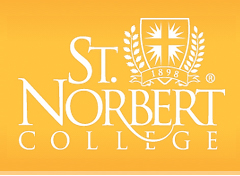Files
Download Full Text (402 KB)
Description
We have examined the frequency spectrum of the blue light generated via four-wave mixing in a rubidium vapor cell inside a ring cavity. At high atomic density and input laser power, two distinct frequency components separated by 116±4 MHz are observed, indicating alternate four-wave mixing channels through the 6p3/2 hyperfine states. The dependence of the generated light on excitation intensity and atomic density are explored, and they indicate that the primary process has saturated. This saturation results when the excitation rate through the 6p state becomes equal to the rate through the 5p state, giving no further gain with atomic density while a quadratic intensity dependence remains.
Publication Date
2-1-2019
Publisher
The Optical Society of America
Disciplines
Physics
Recommended Citation
Brekke, Erik and Swan, Noah, "Saturation and alternate pathways in four-wave mixing in rubidium" (2019). Faculty Creative and Scholarly Works. 20.
https://digitalcommons.snc.edu/faculty_staff_works/20



Comments
© 2019 Optical Society of America]. Users may use, reuse, and build upon the article, or use the article for text or data mining, so long as such uses are for non-commercial purposes and appropriate attribution is maintained. All other rights are reserved.